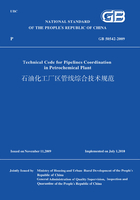
5.2 Direct Burial Laying
5.2.1 The minimum earth coverage thickness for underground pipeline shall be determined comprehensively according to attributes of pipeline media,pipe material strength,earth attribute,value and distribution of ground bearing load,and frozen earth depth.The minimum earth coverage thickness of pipeline laid beneath the driveway should be no less than the specifications in Table 5.2.1.
Table 5.2.1 Minimum earth coverage thickness of pipeline laid beneath the driveway(m)

Notes:1 Beneath driveway refers to the calculation from the top of road surface.
2 The earth coverage thickness for direct burial electric power cable above 10kV should be no less than 1.0m.
5.2.2 In severe cold area,pipelines(except thermal piping,electric power cable,control/telecom cable or optical cable)including water supply piping,circulation water piping,fire fighting piping and fuel gas piping shall be buried below the frozen line,and the distance from top of piping to frozen line shall not be less than 0.15m.
5.2.3 The underground pipeline or pipe trench running though railroad or road shall comply with the following specifications:
1 The net verticle clearance from the top of pipeline or the top of pipe trench cover to the bottom of railroad shall be no less than 1.2m.The net verticle clearance from the top of pipeline to the bottom of pavement structure layer shall be no less than 0.5m.
2 When direct burial pipelines cannot meet the above requirements,protection conduit or pipe trench shall be used.When the road foundation stability is guaranteed,both ends of the protection conduit or pipe trench shall be extended out of the railroad shoulder/embankment toe,urban road surface,highway road shoulder/embankment toe by no less than 1.0m.In case there is a drainage trench by the railroad bed or road side,its conduit or pipe trench shall be extended out of the edge of drainage trench by 1.0m.
5.2.4 The underground pipelines shall not be laid beneath the packing/decking,layout and loading/unloading area of corrosive substance,whose horizontal distance from the BL of the aforementioned area shall be no less than 2.0m.When pipeline is arranged in the downstream direction of drainage from aforementioned area,the horizontal distance from the BL of the aforementioned area shall be no less than 4.0m,however,pipelines shall avoid being arranged in the downstream direction.
5.2.5 The minimum net horizontal distance between underground direct burial pipelines shall be no less than the specifications in Table 5.2.5.
5.2.6 The minimum net horizontal distance from underground direct burial pipelines to the architecture/structure,process facility and tank should be no less than the specifications in Table 5.2.6.
5.2.7 For pipeline with burial depth exceeding the foundation of architecture/structure,process facility and tank,the minimum horizontal distance between the pipeline and architecture/structure,process facility and tank shall be calculated according to the following equation,and shall be converted to net horizontal distance L(as in Fig.5.2.7)and then be compared with the value in Table 5.2.6.The larger value shall be applied.

Where:
L——The horizontal distance between pipeline center and the outmost edge of the foundation of architecture/structure,process facility and tank(m).
H——Pipeline laying depth(m).
h——Depth of foundation bottom of architecture/structure,process facility and tank(m).
B——Trench excavation width(m).
5.2.8 In case of crossing of underground pipelines,the minimum net verticle clearance among pipelines shall comply with the specifications in Table 5.2.8.
5.2.9 The minimum net horizontal distance between underground pipelines and trees shall comply with the specifications in Table 5.2.9.
5.2.10 For direct burial non-metal pipeline,metal line with anticorrosion measure should be taken along the top external wall of pipeline.